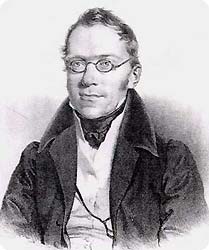| |
 |
|
|
|
Beethoven didn't take on
many music students. |
|
|
|
Beethoven helped him to find work at Vienna, at the residence of Count Browne, and then for Prince Lichnowsky. Ferdinand Ries also worked as Beethoven's scribe and copier. In 1805, Ries left Vienna, but he never forgot his master. He dedicated to him his Two Sonatas for Piano, Opus 1. In 1813, he went to London and became a member of the Philharmonic Society in 1815. The Society, through Ries, invited Beethoven to London. Beethoven never went, although he spoke about it often. Having become rich, thanks to his music and to the lessons he gave, Ries settled definitively at Frankfurt. In 1938, Ferdinand Ries and Gerhard Wegeler published their meetings with Beethoven, entitled "Biographical Notices". Ries composed operas, oratorios, several symphonies and other works, notably for piano. It is difficult to get hold of them today. |
|
Arrangements of Beethoven's works by Ferdinand Ries:
|
|
|
|
|
|
Carl Czerny was the son of Wensel Czerny, the piano master at Vienna from 1786. By the age of ten he knew how to play most of Mozarts works for piano, along with the works of many other renowned artists of the era. Beethoven, after having heard him, proposed giving him piano lessons. This went on from 1801 to 1803, twice a week, but irregularly. Czerny had an astonishing gift of memory. Later he played all of Beethoven's sonatas for piano by heart, notably for Prince Linchnowski. |
 |
|
On Beethoven's recommendation, Czerny became one of Vienna's most reputable teachers. He taught Franz Liszt and Queen Victoria, for example. He taught also Karl, Beethoven's nephew, between 1816 and 1818. Czerny stayed on good terms with Beethoven and worked on several transcriptions for him. Carl Czerny wrote many studies for piano. He also published fingerings for Beethoven's sonatas. He wrote his memoires in 1842: "Erinnerungen aus meinem Leben". And, in 1852, he gave his memories to Otto Jahn who published "Anekdoten et notices sur Beethoven"... |
|
Arrangements of Beethoven's works by Carl Czerny:
|
|
|
|
|
|
Beethoven dedicated many works to him : the trios "Archiduke", some sonatas for piano (Les adieux, Hammerklavier), the triple concerto, the Missa Solemnis, the grande Fugue... The Archduke composed and dedicated to Beethoven 40 variations on Beethoven’s air (WoO 200), and he participated to the Diabelli's variations as many other composers. The collection of the first edition of Beethoven’s works, and the letters which the Archduke received from him, are housed at Gesellschaft der Musikfreunde in Vienna. |
|
|
| Many
thanks to Hannah SALTER for her translation
of this page from French into English © Dominique PREVOT |
 |
|
|||||||||||||||||||